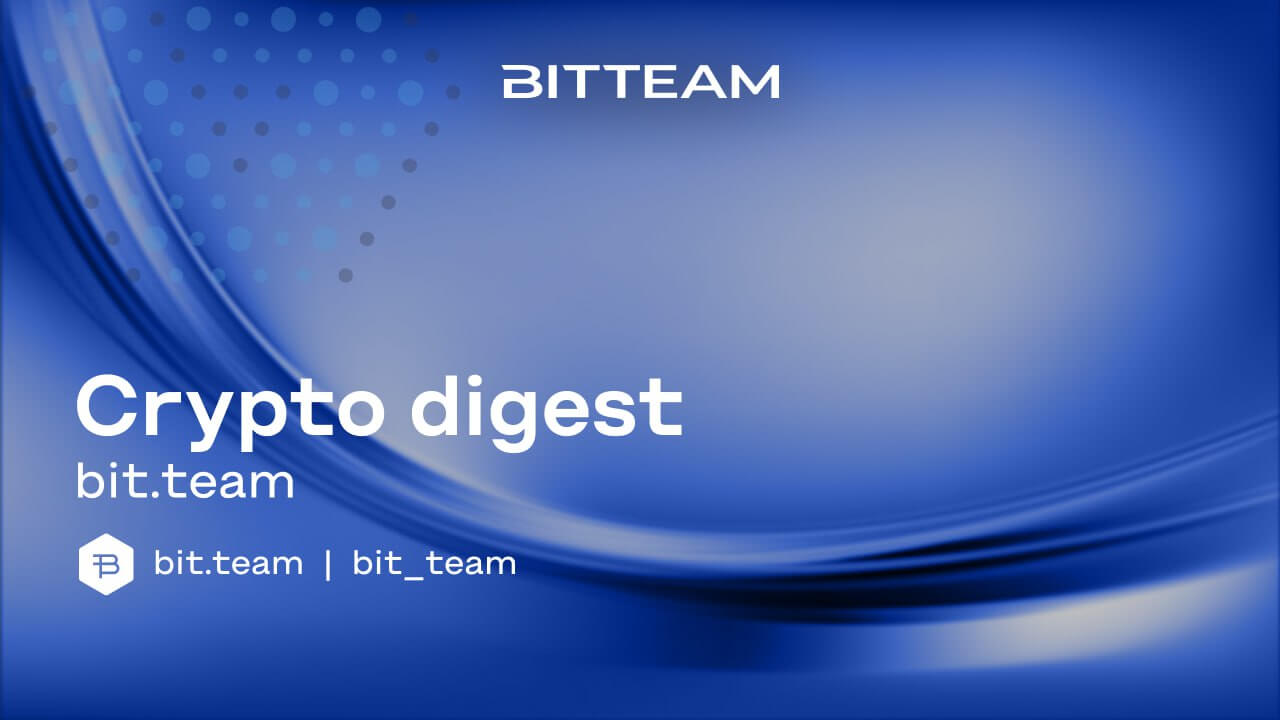14.08.2023
An overview of current news in the crypto space
In our digest, we took a look at a few important crypto industry news over the past week:
- PayPal launches PYUSD stablecoin
- India launches crypto-token-enabled web browser to digitally sign documents
- Bitcoin walkers’ accumulations hit all-time high
- Visa tests Ethereum network payment of gas fees with bank cards
- Central Bank begins pilot launch of digital ruble in 11 Russian cities
And now for more details. Reading time: 6 minutes.
- PayPal, the payments giant, has launched its own PYUSD stablecoin, which is fully backed by U.S. dollar deposits, short-term Treasury bills and similar cash equivalents. According to the company, PYUSD is designed for digital payments, Web3 and compatibility with the most widely used exchanges, wallets and applications. PYUSD will be available starting Aug. 7, and will be rolled out in the U.S. in the coming weeks. The company plans to give its customers the ability to transfer PYUSD within the service and between external wallets, send payments to individuals, pay for purchases and convert to any of the supported cryptocurrencies. It is critical for PayPal to connect to fiat payments, and for PYUSD to provide fast and cheap transfers without a centralized authority. However, on the launch of PYUSD, the Chairman of the US House of Representatives Financial Services Committee, Patrick McHenry, emphasized the need for legislation for “stable coins” issued under a clear regulatory framework.
- Indian government launches national web browser with crypto-token support for digitally signing documents. The Ministry of Electronics and Information Technology has announced the launch of the Indian Web Browser Development Challenge, encouraging local developers to create a browser with an embedded root certificate from the Regulator of Attestation Organizations of India. The browser will have the ability to digitally sign documents using crypto-tokens, which will be embedded in the browser. The competition will last for three rounds, with the winner receiving around 34 million Indian rupees. In recent months, the Indian government has been aggressively pursuing regulation, especially in the technology and cryptocurrency sectors. In August, a bill to simplify data compliance norms for big tech companies was passed, as well as the Digital Personal Data Protection Bill 2023. India supported the Financial Stability Board’s recommendations for a global regulatory framework for cryptocurrencies and called for special attention to creating similar guidelines for developing countries.
- According to Glassnode, long-term bitcoin investors have accumulated a record 14.6 million coins, representing 75% of the circulating supply. This number of bitcoins in the hands of long-term investors is an absolute record. This fact shows that investors continue to believe in the value and potential of bitcoin. In addition, addresses with balances of at least 1,000 BTC and containing at least 10,000 BTC have registered significant growth, indicating the growing demand for bitcoin among whales. Overall, there are signs that better days may be coming for bitcoin, especially if we take into account historical chart patterns that have led to bullish growth in the past. The largest cryptocurrency recently regained the $30,000 mark and continues to fluctuate within that range. Looking forward, increased interest from whales and increased demand for bitcoin from long-term investors could lead to further growth in the cryptocurrency.
- Visa conducted a successful test of paying for gas commissions on the Ethereum network using a credit or debit card. The technology will allow users to pay transaction fees on the blockchain using bank cards. The cost of commissions depends on the load on the network and the complexity of the transaction. The amount of the commission is calculated based on the amount of “gas” required for a particular transaction and its value at the time of the transaction. If this technical solution takes root, the use of Ethereum network may become more accessible and comfortable for a wider range of users. Visa continues to work on blockchain technology and strives to make crypto-payments more convenient and accessible for consumers. The company is using the ERC-4337 standard and the Paymaster smart contract to pay transaction fees on the blockchain using fiat currencies. This is a major step in the development of the blockchain industry and will allow users to not have to maintain a balance in ETH to be able to dispose of tokens. The future of blockchain and crypto-payments is getting closer, and Visa doesn’t want to fall behind these changes.
- The Russian Central Bank is starting a pilot launch of the digital ruble in 11 Russian cities, where 600 individuals and 30 legal entities will take part. The trial will begin on August 15, and customers will be able to open wallets, make transfers and pay for goods and services. The digital ruble will only be used as a means of payment, on which no interest will be charged and it will not be used in loans. Organizations will be able to transfer digital rubles between clients and make payments at merchants for goods and services. The Central Bank of the Russian Federation also plans to automate payment for housing and utilities services with digital rubles. More than 70% of Russians are not ready to switch to digital analogs of the cash ruble, but the Central Bank of the Russian Federation intends to continue testing the digital ruble on various platforms and increase the number of participants. Commercial banks are also ready to test real transactions with CBDC, but state their intention to compete with the digital ruble platform. After testing all transactions on the first group, the number of participants will be expanded.
Thank you for being with us. Crypto-industry news on Bit.team – always up to date.
